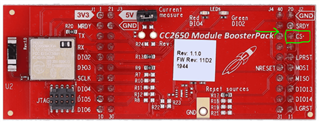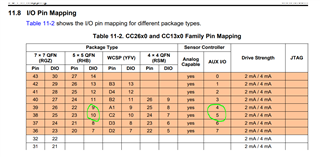Other Parts Discussed in Thread: CC2650, LAUNCHXL-CC2650, BOOSTXL-CC2650MA
Hello,
I am trying to use ADC in CC2650MODA. I am using pin IOID 9 in cc2650MODA to acquire values. I am applying 1.65v across the IOID 9 pin and I am getting an ADC value of 4.
I have modified the board. h and CC2650Launchxl.c file to configure IOID 9 pins. But I couldn't able to acquire the proper value.
Modifications in CC2650Launchxl.c file,
const ADCBufCC26XX_AdcChannelLutEntry ADCBufCC26XX_adcChannelLut[] = {
{PIN_UNASSIGNED, ADC_COMPB_IN_VDDS},
{PIN_UNASSIGNED, ADC_COMPB_IN_DCOUPL},
{PIN_UNASSIGNED, ADC_COMPB_IN_VSS},
{Board_DIO07_ANALOG, ADC_COMPB_IN_AUXIO7},
{Board_DIO08_ANALOG, ADC_COMPB_IN_AUXIO6},
{Board_DIO09_ANALOG, ADC_COMPB_IN_AUXIO5},
{Board_DIO10_ANALOG, ADC_COMPB_IN_AUXIO4},
{Board_DIO11_ANALOG, ADC_COMPB_IN_AUXIO3},
{Board_DIO12_ANALOG, ADC_COMPB_IN_AUXIO2},
{Board_DIO13_ANALOG, ADC_COMPB_IN_AUXIO1},
{Board_DIO14_ANALOG, ADC_COMPB_IN_AUXIO0},
};
const ADCCC26XX_HWAttrs adcCC26xxHWAttrs[CC2650_LAUNCHXL_ADCCOUNT] = {
{
.adcDIO = Board_DIO07_ANALOG,
.adcCompBInput = ADC_COMPB_IN_AUXIO7,
.refSource = ADCCC26XX_FIXED_REFERENCE,
.samplingDuration = ADCCC26XX_SAMPLING_DURATION_2P7_US,
.inputScalingEnabled = true,
.triggerSource = ADCCC26XX_TRIGGER_MANUAL
},
{
.adcDIO = Board_DIO08_ANALOG,
.adcCompBInput = ADC_COMPB_IN_AUXIO6,
.refSource = ADCCC26XX_FIXED_REFERENCE,
.samplingDuration = ADCCC26XX_SAMPLING_DURATION_2P7_US,
.inputScalingEnabled = true,
.triggerSource = ADCCC26XX_TRIGGER_MANUAL
},
{
.adcDIO = Board_DIO09_ANALOG,
.adcCompBInput = ADC_COMPB_IN_AUXIO5,
.refSource = ADCCC26XX_FIXED_REFERENCE,
.samplingDuration = ADCCC26XX_SAMPLING_DURATION_2P7_US,
.inputScalingEnabled = true,
.triggerSource = ADCCC26XX_TRIGGER_MANUAL
},
{
.adcDIO = Board_DIO10_ANALOG,
.adcCompBInput = ADC_COMPB_IN_AUXIO4,
.refSource = ADCCC26XX_FIXED_REFERENCE,
.samplingDuration = ADCCC26XX_SAMPLING_DURATION_2P7_US,
.inputScalingEnabled = true,
.triggerSource = ADCCC26XX_TRIGGER_MANUAL
},
{
.adcDIO = Board_DIO11_ANALOG,
.adcCompBInput = ADC_COMPB_IN_AUXIO3,
.refSource = ADCCC26XX_FIXED_REFERENCE,
.samplingDuration = ADCCC26XX_SAMPLING_DURATION_2P7_US,
.inputScalingEnabled = true,
.triggerSource = ADCCC26XX_TRIGGER_MANUAL
},
{
.adcDIO = Board_DIO12_ANALOG,
.adcCompBInput = ADC_COMPB_IN_AUXIO2,
.refSource = ADCCC26XX_FIXED_REFERENCE,
.samplingDuration = ADCCC26XX_SAMPLING_DURATION_2P7_US,
.inputScalingEnabled = true,
.triggerSource = ADCCC26XX_TRIGGER_MANUAL
},
{
.adcDIO = Board_DIO13_ANALOG,
.adcCompBInput = ADC_COMPB_IN_AUXIO1,
.refSource = ADCCC26XX_FIXED_REFERENCE,
.samplingDuration = ADCCC26XX_SAMPLING_DURATION_2P7_US,
.inputScalingEnabled = true,
.triggerSource = ADCCC26XX_TRIGGER_MANUAL
},
{
.adcDIO = Board_DIO14_ANALOG,
.adcCompBInput = ADC_COMPB_IN_AUXIO0,
.refSource = ADCCC26XX_FIXED_REFERENCE,
.samplingDuration = ADCCC26XX_SAMPLING_DURATION_10P9_MS,
.inputScalingEnabled = true,
.triggerSource = ADCCC26XX_TRIGGER_MANUAL
},
{
.adcDIO = PIN_UNASSIGNED,
.adcCompBInput = ADC_COMPB_IN_DCOUPL,
.refSource = ADCCC26XX_FIXED_REFERENCE,
.samplingDuration = ADCCC26XX_SAMPLING_DURATION_2P7_US,
.inputScalingEnabled = true,
.triggerSource = ADCCC26XX_TRIGGER_MANUAL
},
{
.adcDIO = PIN_UNASSIGNED,
.adcCompBInput = ADC_COMPB_IN_VSS,
.refSource = ADCCC26XX_FIXED_REFERENCE,
.samplingDuration = ADCCC26XX_SAMPLING_DURATION_2P7_US,
.inputScalingEnabled = true,
.triggerSource = ADCCC26XX_TRIGGER_MANUAL
},
{
.adcDIO = PIN_UNASSIGNED,
.adcCompBInput = ADC_COMPB_IN_VDDS,
.refSource = ADCCC26XX_FIXED_REFERENCE,
.samplingDuration = ADCCC26XX_SAMPLING_DURATION_2P7_US,
.inputScalingEnabled = true,
.triggerSource = ADCCC26XX_TRIGGER_MANUAL
}
};
Modifications in CC2650Launchxl.h file
#define Board_DIO07_ANALOG PIN_UNASSIGNED
#define Board_DIO08_ANALOG PIN_UNASSIGNED
#define Board_DIO09_ANALOG IOID_9
#define Board_DIO10_ANALOG PIN_UNASSIGNED
#define Board_DIO11_ANALOG PIN_UNASSIGNED
#define Board_DIO12_ANALOG PIN_UNASSIGNED
#define Board_DIO13_ANALOG PIN_UNASSIGNED
#define Board_DIO14_ANALOG PIN_UNASSIGNED
Modifications in Board.h file
#define Board_ADC0 CC2650_LAUNCHXL_ADC2
What might be the issue?



